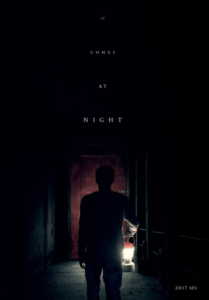
 After just two features writer/director Trey Edward Shults has established himself as a master of capturing drama in tight spaces. Like his previous movie, the indie darling “Krisha,” “It Comes at Night” takes place largely in one residence. And regardless of the setting or the genre, it is a strained family dynamic that ultimately proves to be most terrifying.
After just two features writer/director Trey Edward Shults has established himself as a master of capturing drama in tight spaces. Like his previous movie, the indie darling “Krisha,” “It Comes at Night” takes place largely in one residence. And regardless of the setting or the genre, it is a strained family dynamic that ultimately proves to be most terrifying.
“Night” begins with the death of a grandfather. Stricken with a fast moving disease that has ravaged the nation, the old man has been exiled to a shed outfitted with plastic sheeting. His daughter, son-in-law, and grandson visit him wearing masks and gloves. Duct tape is a part of their every day routine. Making his last days as comfortable as ever, they understand that the old man’s fate may soon be their own.
Holed up in a spacious cabin in a mountainous and isolated area, the remaining family members consist of patriarch Paul (Joel Edgerton), his wife Sarah (Carmen Ejogo), and their teen-aged son Travis (Kelvin Harrison, Jr.). Their world was up-ended when the nation was reduced to something approaching the apocalyptic by some mysterious virus or disease. Details are kept very mysterious. Our point of view is narrow throughout, as we’ve been dumped into this narrative at the point when the family has stopped trying to investigate the outside world. Hope is dwindling.
The family’s household has simple rules—keep the doors locked, arm yourself, wear protective clothing whenever possible, and never go outside at night. The last rule, which is occasionally broken out of necessity, is the key to their survival, because, as we all know, bad things happen at night. And when they are visited by a desperate man in darkness, their fragile existence is threatened.
Performances are uniformly good. Edgerton, who is becoming very well known to audiences, is excellent with this kind of material. He plays a moral man committed to protecting his family. This role is not unlike the state trooper he played in “Midnight Special,” and Edgerton’s rugged everyman quality perfectly fits the bill. But the young Kelvin Harrison, Jr., is clearly the breakout here. This kid’s filmography is already replete with fine work, but Shults has given him a developed character that shows the actor’s range.
“It Comes at Night” is compelling and tense throughout. However, the depressing pall that hangs over everything will be daunting on the viewer. And the mystery will frustrate many as little context is provided to explain things.
But even though the setting and circumstances may be off-putting to some viewers, Shults captures the drama well building credible elements that never seem forced. This is a film that, at times, literally crackles with claustrophobic tension. Just what is out there in the dark? That question is particularly haunting. But what is inside the boarded up cabin might be even more dangerous. Unfortunately, the early tension and provocative questions raised fail to sustain “It Comes at Night” to a completely satisfying conclusion.
